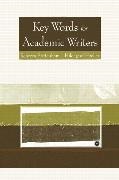Read more
List of contents
Preface.
Alternative Table of Contents.
Introduction: Academic Thinking and the Loss of Common Sense.
Analysis, or the Pleasure of Disruption.
Argument: Aunt Anne's Predicatment and the Logic of Persuasion.
Assignment: By Definition Not A Task.
Assumptions, Or the World Before the Text.
Audience, Or the Listener as the Essay's Other.
Brainstorming, Or How the Other Half Thinks.
Citation, Or the Rolodex of the Academic World.
Claims: Territorial Defense or Promise of Exploration?
Conclusions: The Horror of Ending.
Coordination-Subordination: The Rule of the Sentence.
Counter-Argument, or the Necessary Risk of Academic Thinking.
Dash-Disrupting Academic Prose.
Discipline and Its Discontents.
Editing, or Who is Writing What?
Essay: The Etymology of the College Paper.
Evaluation, or How Does One Handle a Rejection or Bad Grade?
Evidence: Discovery and Proof.
Experimental Writing: Conformity and Rebellion.
Footnotes, or the Autobiographies of Texts.
Free-Writing, a Rather Forced Liberation.
Grammar: The Magic of a Writer's Craft.
Interpretation: When a Banana is Not Just a Banana.
Introductions: The Risk of Beginning.
Keyterms, The Main Characters of Essays.
Metaphor: Its Wonders and Dangers.
Paragraphs: the Unfolding Drama.
Parallelism: Grammar and Equality.
Plagiarism: The Politics of Common Good and Private Property.
Pronoun: Of the Sacred and the Profane.
Punctuation: An Art Within Reason.
Question: Affectation or Inquiry?
Quotation: Show Me How You Quote, and I Tell You Who You Are.
Reading and revelation.
Research: Not On the Trail of the Assassins.
Revision: A Writer's Survival Guide.
Structure, or the Stories Essays Tell.
Subject-Verb, or Sentence Squeeze-Play.
Summary: Leave the Gun, Take the Cannoli.
Syllabus: Social Contract, Utopian Vision, or Draft for the Future?
Synthesis: The Alchemy of Interpretation.
Thesis: Discover by Design.
Titles, Why They Matter.
Transitions: Miracle Workers or Enforcers.
Voice: The Sight of Sound.
Workshop: Collaboration and Production.
Writer's Block: Lame Excuse or Real Condition?
Works Cited, or Why This Entry Gets the Last Word.
Summary
This brief, flexible guide features dictionary-style entries on the key terms and concepts associated with academic and research-based writing, including models and exercises in each entry.
Offering instructors enormous flexibility, the alphabetically-organized entries in this text can be introduced in any order to present discussions of writing college papers-from developing a thesis statement to citing sources. Each entry uses examples from scholarly writing to explain a particular aspect of the writing or research process-analysis, argument, summary, synthesis-and provides concrete, manageable techniques and exercises to help students make their writing work. Entries from different disciplines show the development of specialized knowledge and specific rhetorical practices. A guide to academic culture as well as a writing guide, the text helps students develop skills such as how to interpret a syllabus or analyze an assignment.

